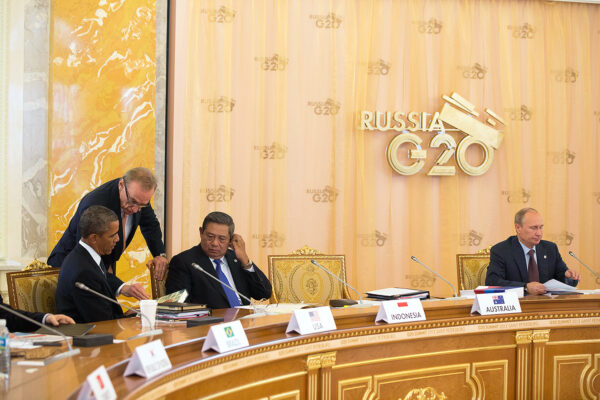
Barack Obama rebuffed critics of his policy toward Russia in an interview with The Atlantic‘s Jeffrey Goldberg that was published on Thursday, arguing that simply projecting toughness was not going to change Vladimir Putin’s mind.
“The fact is that Ukraine, which is a non-NATO country, is going to be vulnerable to military domination by Russia no matter what we do,” the American president said.
He described Ukraine, a former Soviet republic where Russia continues to support a separatist uprising, as an example of “where we have to be very clear about what our core interests are and what we are willing to go to war for.”
“Now, if there is somebody in this town that would claim that we would consider going to war with Russia over Crimea and eastern Ukraine, they should speak up and be very clear about it,” he suggested.
But the idea that “talking tough or engaging in some military action that is tangential to that particular area” will somehow convince Russia to back down is “contrary to all the evidence we have seen over the last fifty years.”
Escalation
Russia occupied and annexed the Crimean Peninsula from Ukraine in 2014 following pro-Western demonstrations in Kiev that ousted the relatively pro-Russian president, Viktor Yanukovich.
Russia accused the European Union of interfering in its sphere of influence by offering the Ukrainians a trade treaty.
European countries and the United States responded to its aggression by imposing sanctions on Russia that have conspired with low oil prices to push its economy into recession.
While Russia sent arms to rebels in eastern Ukraine, Obama has stopped short of providing weapons to the government that took Yanukovich’s place — mindful, Goldberg explains, that “Russia will always be able to maintain escalatory dominance” when it comes to Ukraine.
Real power
Contrary to those who saw a grand strategic design behind Putin’s seizure of the Crimea, Obama argued that the Russian leader “improvised” and has left his country worse off.
The idea that Russia is now in a stronger position “is to fundamentally misunderstand the nature of power in foreign affairs or in the world generally,” he said.
Real power means you can get what you want without having to exert violence. Russia was much more powerful when Ukraine looked like an independent country but was a kleptocracy that he could pull the strings on.
The American argued much the same in an interview with CBS News last year talking about Russia’s support for Syrian dictator Bashar al-Assad.
“You don’t think that Mr Putin would’ve preferred having Mr Assad be able to solve this problem without him having to send a bunch of pilots and money that they don’t have?” he wondered at the time.
The fact that Russia had to intervene in the Syrian war to prop up Assad was “an indication that their strategy did not work,” he said.
Long game
In the long term, Russia must cope with serious demographic and economic problems “that would require not only vision but a generation to overcome,” according to Obama. “The path that Putin is taking is not going to help them overcome those challenges.”
And projecting Russian power abroad in an attempt to appear strong at home is not without its risk.
“I don’t underestimate the dangers there,” the president said.
